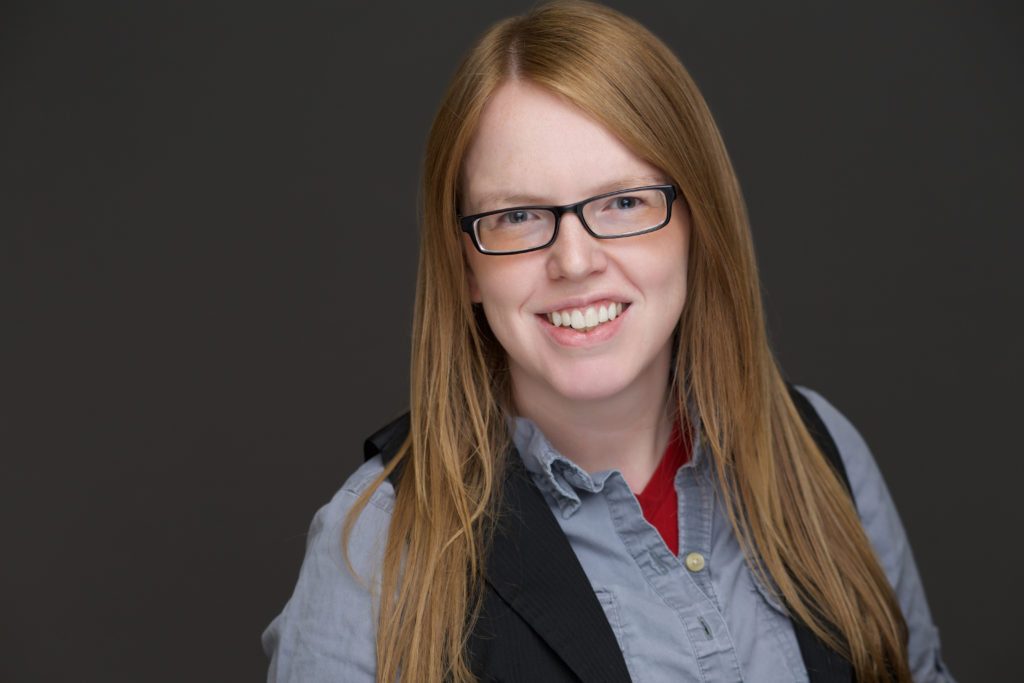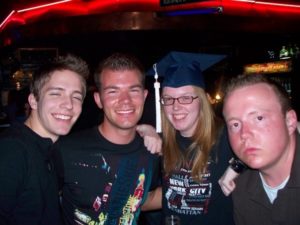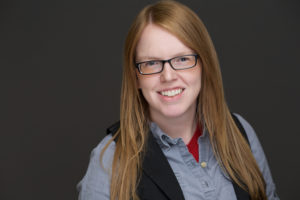Finding My Voice

By Lauren Neaves
(First published on the Echoes of the Struggle Blog)
I was born and raised in the DFW Metroplex in Texas. I’m a pale white girl, with strawberry blonde hair and lots of freckles. And while I wasn’t persecuted growing up based on what I looked like or who I was on the outside, I had a deep-seated fear that I would be if people only knew the real me.
See, I wasn’t like everyone else around me. First off, I was a Mormon. And there weren’t that many of us. Growing up, I had many conversations with friends trying to “save me” because they truly believed that Mormons weren’t really Christians. But the second thing that sets me apart from most of the people that I grew up with is that I’m gay.
Looking back, all the signs were there. While other girls’ walls were covered with pictures of boy bands and teen heartthrobs like New Kids on the Block, Jonathan Taylor Thomas, Jonathan Brandis, mine was covered with pictures of women I admired like Shannon Miller, Mia Hamm, Rebecca Lobo, etc. As a young Mormon kid, I didn’t have the vocabulary to verbalize what I really thought about these women: that they were hella attractive. I could only say that I really looked up to them and admired them; which was true. They were out there killing it at what they did! But there was more to it than that.
In high school, I knew I liked girls but was terrified of it. So much so that, as a senior, I walked out of my creative writing class when our teacher used a clip from Will & Grace, because it “promoted the homosexual agenda.” In reality, I was just a really scared, gay Mormon kid who was sure that if I showed too much interest, people would figure out my deep dark secret.
Funnily enough, it took going to the big Mormon college, Brigham Young University, to finally come out to myself. BYU is located in Provo, Utah. It was there that I finally found myself. I looked up LGBT resources and there was the Utah Pride Center in Salt Lake. At the time, I was still young enough to participate in their youth center and that place changed my life. I remember the first time I walked in and was asked if I was gay or straight. I said I wasn’t really ready to answer that question and no one blinked an eye. They got it. They got me. They understood the internal process I was going through and were there for me when I needed people who understood that the most.
When I started at BYU in 2005, a portion of the honor code read as follows:
“Advocacy of a homosexual lifestyle (whether implied or explicit) or any behaviors that indicate homosexual conduct, including those not sexual in nature, are inappropriate and violate the Honor Code.”
This meant that if you were a gay BYU student, you couldn’t even admit it out loud without fear of being kicked out of school. There were multiple instances where the Honor Code Office looked at my friends. Others and I would be called in to find out whether or not they were gay. When called in, we would deny that they were gay to help save their academic standing. It was a big, gay witch-hunt.
I started getting politically involved when I joined the BYU Democrats and other left leaning groups. A group called Soulforce was doing a seven-week, national bus tour called “The Equality Ride.” The Equality Riders made 19 stops and visited 18 religious schools; and BYU was one of those 18 schools. At each of these institutions, there was a lot of discrimination against the LGBTQ+ population. The riders’ goal was to challenge homophobia and help the LGBTQ+ community achieve freedom from religious and political oppression.
At the time, Equality Ride co-director Haven Herrin said that BYU had one of the toughest, most stringent policies. The purpose was not to demand any change in policy, but to bring about understanding of what it’s like to be LGBTQ+. There is a lot of shame and suffering, brought on by religious-based discrimination.
A group of both Soulforce riders and BYU students marched around the edge of campus, as they were prohibited from actually entering campus by BYU police, and staged a “die in” near the main entrance. They lie down and placed lilies on their chest representing LGBTQ+ Mormons who had died by suicide.
One of the high profile LGBTQ+ Mormon suicides at that time was Stuart Matis; a 32-year-old who committed suicide on the steps of a Mormon church. His note rings true for many LGBTQ+ Mormons.
“…The church has no idea that as I type this letter, there are surely boys and girls on their calloused knees imploring God to free them from this pain. They hate themselves. They retire to bed with their finger pointed to their head in the form of a gun. Every waking moment of every day they must be on constant alert not to divulge any clues that will identify themselves to their peers. ‘Was my glance at that boy too long?’ ‘Does he think I’m gay?’ ‘Will he now publicize my secret and beat me up?’ They are afraid of their parents. They are afraid of their bishop. They are afraid of their friends. They have nowhere to go but to lay on the floor curled in a ball and weep themselves to sleep…”
At the rally, a friend shared that he spent months in the hospital and rehab after a near-fatal car wreck. He said that during his recovery, his mother told him that it would have been better if he had died in the accident than lived as a gay man. Sadly, this is a common theme. My mother made a similar comment many years before I finally came out to my parents. She said that if she had a gay child, she’d kill herself. And while she doesn’t remember making that comment, it did push me further into the closet and made me afraid of being my authentic self.
After the rally, the BYU Police arrested 24 people, among them five students, who participated in the demonstration. I knew then that I, too, needed to be a voice for other LGBTQ+ Mormons.
In 2007, the Honor Code was updated to read:
“Brigham Young University will respond to homosexual behavior rather than to feelings or orientation and welcomes as full members of the university community all whose behavior meets university standards … One’s stated sexual orientation is not an Honor Code issue.”
For a moment, it felt as if my friends and I could breathe. We could finally say “I’m gay” out loud without fear of losing our academic standing. Acting on one’s homosexual feelings was still prohibited at BYU; so that meant no dating. But being able to admit it was a huge weight off my shoulders. I started slowly coming out to more friends at school. I told my roommates my last year of school, and they were nothing but kind and accepting. Then California Proposition 8 happened.
Prop 8 was a California ballot proposition and a state constitutional amendment against same-sex marriage. The Mormon Church publicly supported and funded Prop 8. They set up door-to-door canvassing to encourage the vote for Prop 8 in California. and contributed over $20 million to “protect traditional marriage.”
Just when it was getting easier to be a gay BYU student, the university paper printed letters to the editor comparing gay individuals to rapists and murders. Tables encouraging California students to vote for Prop 8 were all over campus. Many guys said that, if they had a gay roommate, they would “beat his face in.”
People celebrated when Prop 8 passed; exclaiming that marriage had won. I was heartbroken. I was coming to realize that the LDS church would never want someone like me. Some friends and I went to the protest and marched around Temple Square in Salt Lake City. The signs read “pulpit politics” and “we didn’t vote on your marriage.” It was a powerful experience to be around other gay Mormons and straight allies. Even though we felt as if we had lost the battle, we were becoming more vocal. We were rallying together and fighting for what we believed in.
It took a while to find my voice, but now that I have, I will continue to call out injustices I see and use my voice for good. I am proud of who I am. I am proud of who and how I love. And I will continue to use my voice for good and for acceptance.


Lauren Neaves,
You are such a cool woman. I love reading your posts and watching you grow. Someday we must meet and talk.
You are so loved! I’m constantly amazed by your kindness, advocacy, and sheer determination to fight hate with love. I love your bravery and your selflessness, and the fact that you take no credit for the things you do to make lives better. I’m proud to call you my friend. Let your light so shine! Dear friend, you represent all that is good and right and just in this world, and if you ever doubt, know that I love and support you always. Thank you for all you do. My home is always open to you, and I hope to continue to be worthy of your friendship.
I really appreciate the perspective. You were experiencing this as I was beginning to go through it myself but as a father of a LGBTQ child who basically came out at age three. By the time he was 7 in 2010 I walked with a group in Pride. Straight Guys For Equal Rights. We (My business partner and myself and a gay friend) put it together. We literally were concerned that we would lose business for doing it as we are based in Utah County. But I knew I had a gay kid even if he could not really vocalize it (he is trans). Any more than to tell us he wanted to be a boy… And I had to do something. I am almost sad I missed paying much attention to Prop 8. That’s sad… but I was a typical young LDS father and it just did not seem all that relevant. It is sad that we just don’t involve ourselves in things like this unless we feel they specifically affect us. They do. I watch for more opportunity to speak out for other marginalized groups now. I am trying to do better. Love your writing.